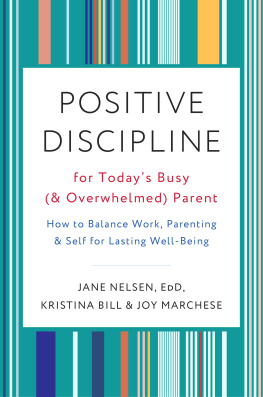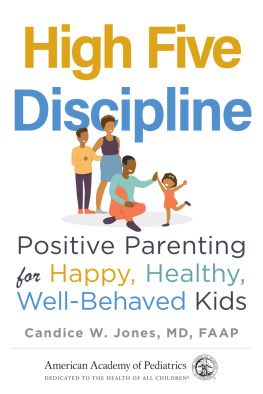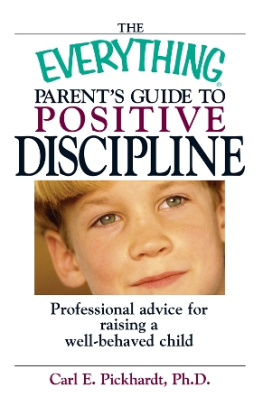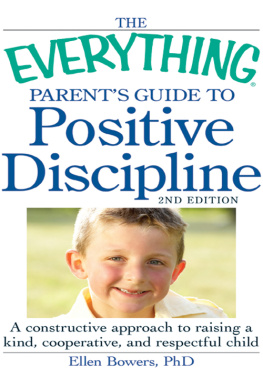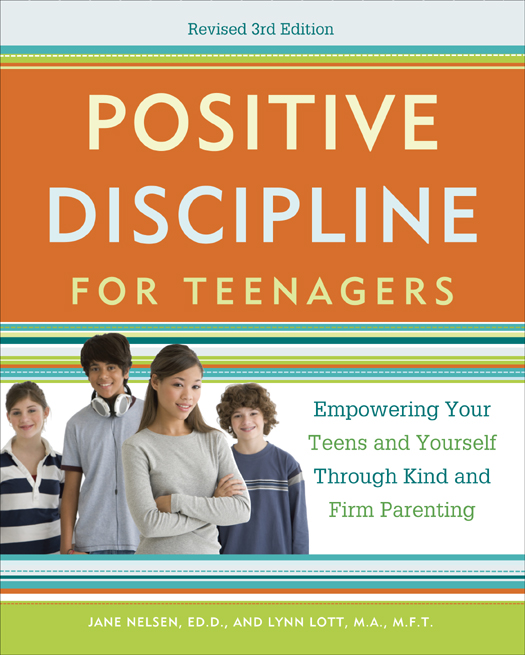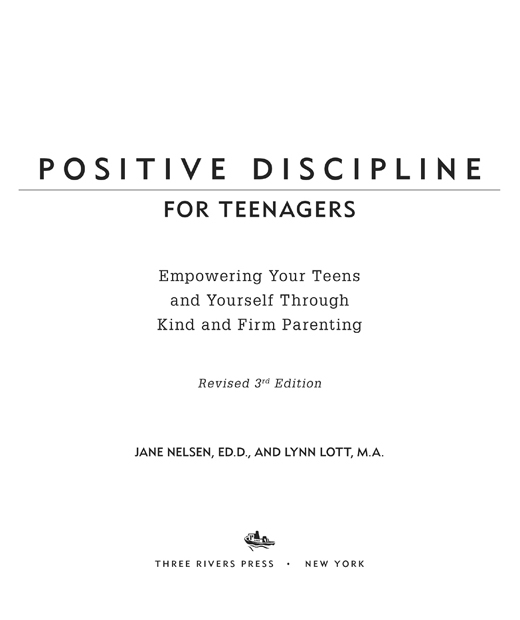Also in the Positive Discipline Series
Positive Discipline
Jane Nelsen
Positive Discipline: The First Three Years
Jane Nelsen, Cheryl Erwin, and Roslyn Duffy
Positive Discipline for Preschoolers
Jane Nelsen, Cheryl Erwin, and Roslyn Duffy
Positive Discipline for Special Needs Children
Jane Nelsen and Lynn Lott
Positive Discipline in the Classroom, Revised and Expanded3rd Edition
Jane Nelsen, Lynn Lott, and H. Stephen Glenn
Positive Discipline: A Teachers AZ Guide, Revised and Expanded 2nd Edition
Jane Nelsen, Roslyn Duffy, Linda Escobar, Kate Ortolano, and Debbie Owen-Sohocki
Positive Discipline for AZ, Revised and Expanded 3rd Edition
Jane Nelsen, Ed.D., Lynn Lott, M.A., M.F.T., and H. Stephen Glenn
Positive Discipline for Single Parents
Jane Nelsen, Cheryl Erwin, and Carol Delzer
Positive Discipline for Your Stepfamily
Jane Nelsen, Cheryl Erwin, and Stephen Glenn
Positive Discipline for Parenting in Recovery
Jane Nelsen, Riki Intner, and Lynn Lott
Positive Discipline for Childcare Providers
Jane Nelsen and Cheryl Erwin
Positive Discipline for Working Parents
Jane Nelsen and Lisa Larson
Positive Time-Out: And Over 50 Ways to Avoid Power Strugglesin the Home and the Classroom
Jane Nelsen
Copyright 1994, 2000, 2012 by Jane Nelsen and Lynn Lott
All rights reserved.
Published in the United States by Three Rivers Press, an imprint of the Crown Publishing Group, a division of Random House, Inc., New York.
www.crownpublishing.com
Three Rivers Press and the Tugboat design are registered trademarks of Random House, Inc.
Previous editions of this work were published by Prima Publishing, Roseville, California, in 1994 and 2000.
The case studies are based on actual events, but names have been omitted or changed to protect the privacy of the people involved.
All products mentioned in this book are trademarks of their respective companies.
Library of Congress Cataloging-in-Publication Data is available upon request.
eISBN: 978-0-7704-3656-8
Illustrations by Paula Gray
Cover photograph by Jose Luis Pelaez, Inc.
v3.1
To parents and teens,
to help them make the transition
from childhood to adulthood
joyful and empowering.
CONTENTS

INTRODUCTION
R emember when your teen was a baby just learning to walk? What a milestone. You didnt want to miss any of it, and you were very supportive and encouraging. You would take her little hands in yours and start walking along with herbut you knew you had to let go in order for her to walk by herself. You also knew she might fall when you let go, but you had faith that this was just part of the process.
So, you let go, and she took a few wobbly steps and fell. What did you do? You probably encouraged, Look what you did! You took a few steps. You can do it. Lets try again. You were both having a great time. When she got tired of the game and didnt want to practice walking anymore, you backed off and waited awhile. You had faith that she would master walking in time.
Meanwhile, you prepared her environment. You childproofed your home. You covered sharp corners and removed breakable objects that could hurt your child. You created a safe space in which she could expand her skills. We call this bridge building, and you are the bridge builder. When your children are small and helpless, you build bridges that have sides close together, so your children have safety with room to move about, experiment, learn, and grow. As your children get older and more skilled, you move the sides of their bridges farther apart so they have more room to move about freely while continuing to be safe.
Now you have a teen who is learning to be an adult. Where are the sides of the bridge today? Are you closing them in because of your fears? Are you expanding them to support his process? Do you know you have to let go before he can master adulthood? Do you know that when you do let go, he will stumble and fall? When he falls or makes a mistake, do you understand that this is just part of the growing process? (Didnt you stumble and fall and make mistakes?) Do you encourage and cheer and show your faith in him to make it?
Adolescence is an important part of the growing-up process. During this time, teens try to find out who they are and separate from their parents. Brain research confirms this, explaining that the adolescent brain casts the teens less as a rough draft than as an exquisitely sensitive, highly adaptable creature wired almost perfectly for the job of moving from the safety of home into the complicated world outside (http://ngm.nationalgeographic.com/2011/10/teenage-brains/dobbs-text).
The problem is that most parents use many parenting tools during this time that make situations worse instead of better, even to the point of impeding and stopping the teen brain from doing its job. This book will help you educate, challenge, and support teens in an atmosphere of mutual respect that affirms your self-worth as well as the self-worth of your children. This book will give you tools to help your teens become the highly functional adaptive adults they can be. An added bonus is that youll learn to explore your own unresolved teen issues and move yourself forward too.
Every chapter in this book has such important information that it was difficult to decide which chapters should be at the beginning. We thought all of them warranted at least first or second status. Therefore, read the chapters in any order that appeals to you, because all of them will help you retrain yourself so you can parent your teen more effectively.
This book is about kind, firm, and encouraging parenting. We know that going through the teen years can be like going through a war zone for both you and your teens. Kindness and firmness can fall away and be replaced by less encouraging parenting methods. It is easy to lose your sense of awe along with your sense of humor. Remember how cute and adorable you thought your teen was when he stumbled as a babyand now you may look at your teen and ask yourself, What have I created? Who is this person? How did this happen? What do I do now? Many people will tell you that control (through punishment and rewards) is just what your teen needs.
Although control sometimes provides the illusion of success on a short-term basis, children who are raised with choices, responsibility, and accountability are more likely to develop the social and life skills that will serve them well throughout their lives. This book will help you find answers and principles that work instead of throwing in the towel or giving up on your child or yourself. Working with your teenager can become an opportunity to learn or relearn the meaning of mutual respect. When you learn to parent with kindness and firmness instead of control, youll discover what a fascinating individual your teen is.


